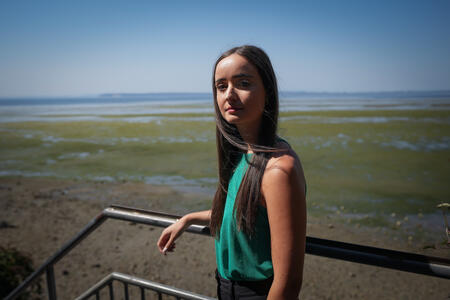
Madeline Lauener
Vancouver BC
Canada
This story appeared in The Globe and Mail.
Madeline Lauener was 14 when she received a stem cell transplant from her sister to treat a rare type of blood cancer. A decade after that difficult experience, she looks at her successful treatment from a different perspective.
“I was lucky because my sister’s stem cells were a perfect match for my type of cancer,” she says.
Madeline had non-Hodgkin’s anaplastic large cell lymphoma (ALCL), a type of blood cancer where lymphocytes – white blood cells that usually fight infection – grow out of control. These cells build up, causing swelling in the lymph nodes or other parts of the body such as the lungs or skin. Symptoms can also include fever, night sweats and weight loss.
With onset typically occurring around age 12, ALCL accounts for approximately 10-15 per cent of all pediatric non-Hodgkin lymphoma (NHL), meaning there are around 10-15 cases per year in Canada.
Not everyone has the same luck as Madeline when faced with a blood cancer diagnosis; 25 per cent of children who receive a stem cell transplant develop a major debilitating disease called chronic graft-versus-host-disease (cGvHD). It can affect organ systems including the skin, gut, liver, lungs and heart and in severe cases it is fatal.
Now in remission for nearly 10 years, Madeline’s experience has led her to pursue a career learning how to help kids diagnosed with cancer. After graduating from Simon Fraser University in 2020, she began a PhD in the faculty of medicine at the University of British Columbia and starts year three of the program this fall. She is planning to become a pediatric oncologist.
“Having experienced cancer myself, I’ve seen the significant effects it has not just on patients, but also families, and all the people who are around to support you,” she says. “It instilled a passion in me to go into this field and make a difference.”
Treatment for people ‘who are out of options’
As part of her program, Madeline works with researchers at B.C. Children’s Hospital, where she was treated, on a treatment called Chimeric Antigen Receptor Therapy, or CAR T-cell therapy.
CAR T-cell therapy uses a patient’s own immune T-cells to detect and kill cancer cells. It’s a complex process that involves extracting T-cells from the blood and genetically modifying them in a lab – supercharging them to be put back into the patient’s bloodstream where they multiply and search and destroy cancer cells.
“CAR-T is a change of paradigm. It saves people who are out of options,” says Nadine Prevost, research and community support director at the Leukemia & Lymphoma Society of Canada (LLSC).
This cell therapy is particularly promising because it can be effective in some blood cancers that have not responded to other treatments. Because it’s so new and leading edge, it’s an expensive process that can cost the medical system as much as $1-million per patient.
The costs can be brought down as researchers advance the CAR-T process and new facilities are built and deployed, but this takes time. CAR-T is highly personalized medicine, tailored to each individual, and it requires significant infrastructure and expertise to produce and deliver this highly specialized treatment safely and successfully.
“We need to be able to offer new, innovative treatments like this within Canada, but it’s more than just adding a new drug to a list – we need new equipment and training to provide these solutions to more Canadians in a sustainable way,” Ms. Prevost says.
One major hurdle is that Canada has not had the laboratory facilities where these personalized T-cells can be modified to fight patients’ cancers.
“The people who need treatment don’t need to go to the United States, but their cells need to go there to be analyzed,” Ms. Prevost explains.
This limits Canadian researchers in their ability to lead CAR-T clinical trials in Canada, requiring patients to wait for trials to pass clearance in another country before they can be cleared here.
Improving access to cutting-edge therapies
In an effort to bring CAR T-cell therapy to more Canadians, the LLSC has partnered with BioCanRx, a network of scientists, clinicians, academic institutions, non-governmental organizations and industry partners, working to accelerate the development of leading-edge immune oncology therapies.
The partnership has spawned an exciting new clinical trial, led by Dr. Natasha Kekre, a hematologist at The Ottawa Hospital. The trial is unique because it is the first to develop and manufacture CAR T-cells in Canada.
The goal is to expand researchers’ ability to manufacture made-in-Canada CAR T-cells and, ultimately, improve access to the life-saving treatment. Dr. Kekre has been manufacturing and administering a CAR T-cell product in a phase one clinical trial at sites in Ottawa and Victoria.
LLSC is one of the funding partners in this initiative, providing $500,000 this year to support the project.
“It’s one of many important projects we support,” says Ms. Prevost, noting that all of LLSC’s projects benefit from individual donations from across Canada.
As initiatives like this one move forward, the treatment options for people with blood cancers continue to expand. CAR T-cell therapy is now offered at cancer centres in Ontario, Quebec, Alberta and Atlantic Canada. At B.C. Children’s Hospital, Madeline Lauener has worked with oncologist Dr. Kirk Schultz, director of the Michael Cuccione Childhood Cancer Research Program, investigating immune cells.
Madeline says that she is continually inspired by the innovation and dedication of blood cancer researchers, particularly as someone who survived her own diagnosis.
“I know from experience that cancer can make you feel lonely,” she says. “But everyone should know that people are working tirelessly – you are not alone.”
To ensure cutting edge research like Canada’s first CAR T-cell initiative continues, donate at bloodcancers.ca